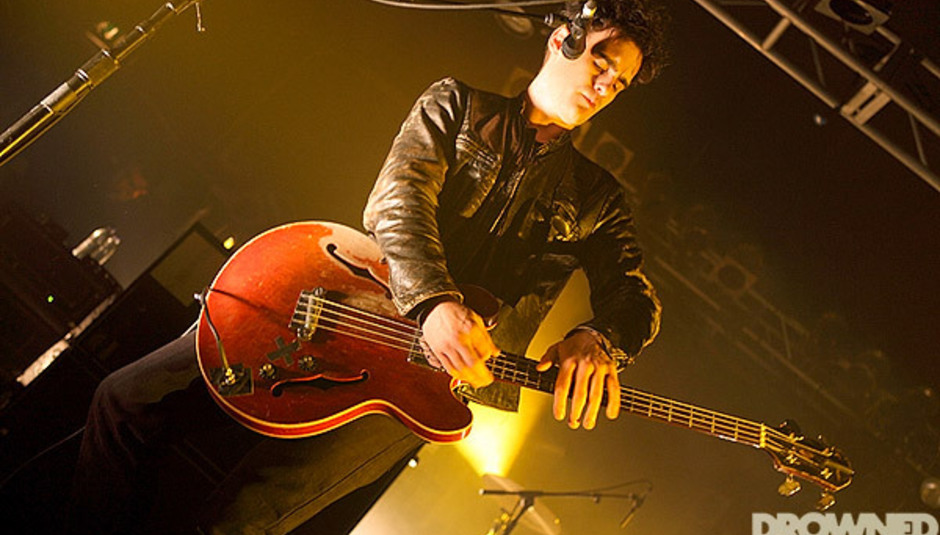Black Rebel Motorcycle Club have probably experienced more ups and downs during their twelve year existence than most bands would get through in a lifetime. Heavily tipped to be one of the biggest outfits of the new millennium on the back of their debut album B.R.M.C. in 2001, they've endured numerous in-band bust ups culminating in the departure of original drummer Nick Jago, not to mention changes in style and sound just as mainstream commercial success beckoned, a move which undoubtedly contributed to their parting of ways with Virgin Records. While initially endorsed by the likes of Noel Gallagher, their obvious disdain of celebrity culture and its trappings meant that more often than not, records such as Howl and Baby 81 only received a modicum of praise while artists less deserving seemed to steal their thunder.
Having finally replaced Jago two years ago with former Raveonettes drummer Leah Shapiro, founding duo Robert Levon Been (bass/vocals) and Peter Hayes (guitar/vocals) set about re-inventing their sound with the fully instrumental long player The Effects Of 333 while earlier this year their sixth album Beat The Devil's Tattoo saw them return to the more traditional sound of their debut. Indeed, we at DiS thought it arguably their best record for quite some time, its wares meriting a more than respectable 8/10.
Currently back in the UK for the second time this year, DiS managed to track down a tired and weary Robert Levon Been prior to their show at Nottingham's Rock City.
The UK leg of your tour started last night in Portsmouth. How did it go?
Robert: Pretty well, although the coach ride up to Nottingham was scary. We were skidding all over the place so it was a case of "hold on tight and hope for the best".
You've attained a loyal following over here since your first UK tour back in 2001. Tonight's sold out I believe?
Robert: We seem to have been adopted by UK audiences right from the start. It's strange really because most of the big cities here play host to great bands seven nights a week, which is why I think we're more appreciated in smaller towns and cities where there's less traffic, if you know what I mean. We always seem to have more fun when we veer off the beaten path. It's worse in the States. In the big cities you get a lot of people just standing there with their arms folded judging every little fucking thing we do.
With an extensive and distinguished back catalogue of songs to choose from, how do you decide what to include in your set and what to omit?
Robert: We used to fight about it all the time, but there's no way you can please everybody, so we tend to just play more for ourselves. Before when we had released just a couple of albums it was easy to work out which songs people wanted to hear the most but now it's kind of impossible. There are probably eight songs off each of our albums plus numerous b-sides that we rehearse before we go on tour so it gives us the option to change the set every night if we wish. Sometimes it feels like too much trouble to make everybody happy so I guess it's easier to make no one happy!
Are there any songs that you listen back to now and wish you'd recorded or arranged differently?
Robert: There's a couple which we play differently to how they sound on record. Some we've extended parts that seemed to end abruptly, songs like 'Weight Of The World', 'Mercy' and 'Six Barrel Shotgun'. Actually, most of our songs have changed and evolved over time, and then we've some songs we've been sitting on for four or five years waiting for that final piece to emerge.
It's interesting you say that particularly as one of your oldest songs 'Evol' finally made it onto Beat The Devil's Tattoo six or seven years after first appearing as a demo online. What made you release it now after all this time?
Robert: You know, the funny thing is 'Evol' is one song we never changed at all! That's just a good song that for some reason got left off every album from Take Them On, On Your Own onwards. We tracked it every time. It's funny because me and Peter always have the debate over which songs will make the final cut and it almost ended up on the chopping block for this album which I thought was ridiculous after ten years. Any song which has been debated over this length of time deserves to be on a record - it's obviously stood the test of time - so I guess a little persistence paid off and it's finally got to have its day.
Are there any other songs hiding away in the vaults which might make an appearance soon?
Robert: We actually played a song during soundcheck today called 'Intentions', which is one of the first songs me and Peter ever wrote together. There's a couple more too I guess which still lack that final ingredient, so for the time being we've put them to one side. Sometimes you've just got to be patient when it comes to songwriting because occasionally you're so far away from knowing the headspace you're at that if it doesn't come naturally to force it could ruin the song altogether.
Beat The Devil's Tattoo in many ways feels like a return to the style and sound of your first record. Was that a conscious decision or just something that developed naturally?
Robert: It kind of does I guess. When we first started the album, neither me or Peter had any preconceived idea. We just wanted the record to take its own shape from the very beginning. It would have been quite false if we'd deliberately attempted to force the direction of the record. Instead we just let the songs evolve naturally, more by extended jams than anything else. In a way the whole process was quite refreshing for us, because it kind of confirmed that we still had a lot to offer as a band. We realised at that point that there's still plenty of mileage for Black Rebel Motorcycle Club, still lots to be said and still lots of places for our music to go. There's a good fire between the three of us at the moment and I think by keeping out of the way and not worrying about any conceptual diversions we made an album that sounds naturally raw.
The record received mixed reviews, Pitchfork's being particularly scathing. Do you pay much attention to what the music press say about your band?
Robert: Pitchfork are funny ones. They're just trying to get noticed by writing something extreme. They tend to pride themselves on writing a review that's so bad it automatically gets attention. It's the same with the NME over here. They either write reams of ridiculous praise which you barely deserve or the exact polar opposite. The NME gave us such a bad review that we went and made a t-shirt out of it. It was a silhouette of a girl bending over another girl spanking her from behind with this paddle with our name over the top in the same font and logo as the NME with the full review printed below. I guess we have enough problems trusting our friends never mind someone in the media who's probably getting paid to dislike us.
At thirteen tracks and over an hour long, and with songs on there like the closing 'Half State', which clocks in at over ten minutes, you can tell it was recorded with a live feel to it.
Robert: A lot of the songs on Beat The Devil's Tattoo actually started of at ten minutes long and we had to shorten them down, which is usually the case! 'Half State' we decided to leave because it had that climactic feel about it, and in its place at the end of the record seemed the perfect way to close the album. I don't really have a heavy explanation for the way that song developed you know....it gives me piece of mind to know that something like that just happened naturally. The next album I know we may try to steer in a different direction. We've already got some ideas, and when we sit down and put them together as songs I know it won't be the same as this one. I like this album in that we just recorded it as we went along and hoped for the best, almost like trial and error in many ways.
You mention the next album. Are there any songs finalised at this moment in time?
Robert: Yes and no. There's sounds and ideas, more pieces than usual but they're not finished. There's still a lot more writing to be done but the good thing is we've left ourselves room to take the ideas into more interesting places.
Do you see it being a full-on electric record or something more stripped back like Howl?
Robert: I think it's gonna take its time. It may well end up as a combination of the two. I think there's gonna be space within it...I know that sounds really strange but there's a certain rhythm and pace to our albums so far and I get the feeling the next one will be more open. I don't really know how to explain it but if you were to have a script, and that script was actually made up of dialogue rather than purely rehearsed prose, that's how I see our next record being like. It's a really awkward description but probably the closest I can get right now.
Beat The Devil's Tattoo was self-produced. Is there a reason why you've decided to produce your own material in recent years, and is there any producer you would like to work with in future should the opportunity arise?
Robert: You know, we don't really trust people that well, and it's difficult for us to hand our music over to someone else who wants to change it. Maybe in time we will go to a producer and let them put their own stamp on one of our recordings, but I don't think they could do a better job than us. Me and Peter have a mutual understanding of knowing what the other one wants. We've had people mix our records in the past and it's ended up sounding completely different to what we wanted.
Aside from the download-only The Effects Of 333, Beat The Devil's Tattoo is the first full-length record of yours to feature Leah Shapiro on drums. How did she end up joining the band?
Robert: We've known her for a while now. She was playing in a band who opened for us on tour a few years ago, and we'd see her playing live every night where she was by far the best thing about the band. She just plays like she's in a trance you know...even more than we do at times! It's incredible to see someone so within themselves musically, and when the opportunity came for her to join the band we knew we couldn't let it slip. Physically she can keep up too whereas a lot of musicians - guys I'm talking about here more than anything - would struggle with what we do. She's also the right kind of spirit we need around us right now.
Do you see her becoming involved in the writing process?
Robert: Yeah, definitely. Me and Peter write the words but that's only a minor part of what the songs are about. Musically she has so much to give that I think we'd be foolish not to involve her.
At the same time, Nick Jago your original drummer was a seemingly integral part of the band. Was it quite a difficult period leading up to and just after his departure and do you see yourselves ever working with him again in the future?
Robert: Nick is an incredible drummer physically. He could read us really well at the beginning, and that's why it wasn't working towards the end. It's less about personality because he was always interesting, but he stopped listening, and as basic as that sounds it's what made it untenable for him to be in the band. You can stop listening in life itself and all of a sudden it becomes like tuning out, you know. Even in the moments of playing songs he wasn't really listening and I think he had his own songs in his head that he was paying more attention to. We hoped that there was room for both, only he didn't see it that way.
One of the songs on the current record 'Bad Blood' mentions in the chorus "I can see it in your eyes and now it's gone". Was that a specific lyrical reference to Nick Jago?
Robert: Peter wrote the chorus for that - I only wrote the verses so I couldn't really say what he meant by that. It's the way a lot of the songs go. They're connected, but as far as a specific literal meaning to that goes, I'm not sure. I kind of have the same question in the back of my head! All of the songs from the band's beginnings have been about break-ups and love and loss so I guess Nick could take credit for a whole lot of songs if you want to put it literally!
You've set up your own label, Abstract Dragon. Will there be any other artists records released in the forseeable future or is it purely for Black Rebel Motorcycle Club at this moment in time?
Robert: It's a difficult time for musicians, so I think we'll be using the label to keep our own band afloat at the minute. I don't really want to subject anyone else to our own experiments or whims at this stage.
Are there any new bands that have caught your attention recently?
Robert: I've seen so many great new bands lately. The Black Ryder and Dark Horses are two of my current favourites. I wouldn't want to namecheck too many as I guess that would be more of a hindrance to them than anything. I'm not sure of our model for success just yet!
Finally, if you had to choose one album as being the definitive Black Rebel Motorcycle Club record which would it be?
Robert: It would be too much like 'Sophie's Choice' for me; you can't choose one child over another, and I have equal amounts of problems with all my kids! They're all like different chapters of a book really, and I couldn't imagine that book with one part missing.
Their tour continues until the middle of this month, calling in at:-
December
17 St Petersburg GlavClub
18 Moscow Milk Arena






















